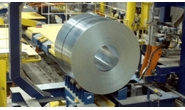Government/Policy

May 18, 2019
Lifting of Tariffs “Pure Good News” for Most
Written by Sandy Williams
The agreement to terminate Section 232 tariffs on Canada and Mexico and all retaliatory tariffs was welcomed by many industry associations. As Prime Minister Justin Trudeau said in his announcement remarks on Friday, it was “pure good news.”
“On behalf of the membership of the CSPA, we thank the Government of Canada for its significant efforts on the resolution of the 232 steel tariffs,” said Catherine Cobden, president of the Canadian Steel Producers Association. “The lifting of the tariffs is the best outcome for our producers, our workers and the highly integrated marketplace between Canada and the U.S. We welcome the return to free trade between our two nations.”
The Coalition of American Metal Manufacturers and Users welcomed the end of the tariffs and the decision not to replace the measures with quotas:
“The Coalition welcomes the agreement to remove the Section 232 steel and aluminum tariffs from Canada and Mexico. We urge the Trump administration to terminate the remaining Section 232 steel and aluminum tariffs on our other trading partners as quickly as possible. These tariffs are damaging the U.S. manufacturing sector, and particularly downstream U.S. steel and aluminum consuming companies, by increasing prices and lead times for both domestic and imports of steel and aluminum and making the U.S. an island of high steel prices.”
U.S. Chamber of Commerce President and CEO Tom Donohue noted in a statement:
“The Chamber applauds the administration’s decision to lift the tariffs on steel and aluminum imports from Canada and Mexico. This move, coupled with the lifting of retaliatory duties, will bring immediate relief to American farmers and manufacturers. Critically, this action delivers a welcome burst of momentum for the USMCA in Congress, and we urge the administration and Congress to continue their efforts to chart a path toward its approval as soon as possible.”
American Trucking Associations President and CEO Chris Spear cheered the tariff announcement.:
“Trucking and trade are synonymous, and this decision by President Trump is a huge step toward achieving a vital national priority—ratification of the United States-Mexico-Canada Agreement. The more than seven million Americans in the trucking industry cheer this decision and will work hard to see ratification of this critically-needed modernization of trade policies with our neighbors to the North and South.”
HARDI’s Palmer Schoening, vice president of government affairs, said in an advisory to members, “The addition of tariffs on steel and aluminum put in place last year has increased prices on many HVACR products and caused retaliatory tariffs from our trading partners. With the removal of the tariffs from our largest source of steel imports, we are one step closer to returning to price stability that has been interrupted by various trade disputes in recent years.”
United Steelworkers International President Leo Gerard said the agreement will help “restore confidence and stability to the North American steel and aluminum markets.”
“From day one,” said Gerard, “we made it clear that the real problem isn’t Canada or Mexico, but those countries that are undermining the trading system through predatory trade practices and non-market policies that have created massive overcapacity and trade imbalance.”
USW International Vice President Thomas Conway noted that Canada and Mexico are “expected to be partners in ensuring that unfairly traded products won’t undermine the strength of our steel and aluminum companies.” He added, “We expect that the companies that benefitted from the Section 232 actions and today’s deal will invest in their operations and their workers, rather than jeopardizing our security interests by lining their pockets.
The Alliance for American Manufacturing was a strong supporter of the Section 232 tariffs. AAM President Scott Paul issued the following statement:
“The administration’s steel trade enforcement action has stabilized the domestic industry to a point where it believes alternative arrangements can be made with Canada and Mexico. Domestic output and capacity utilization are up, more than 12,000 new jobs have been announced and import penetration is down. Steelmakers are investing billions of dollars in their American facilities. Meanwhile, there are 476,000 job openings in manufacturing, where the unemployment rate is an astonishingly low 3 percent.
“However, the work is not done. Global overcapacity is still a significant challenge. Congress and the administration must remain vigilant against dumping, circumvention and transshipment, subsidies, overcapacity, and other challenges facing our steelmakers.”







